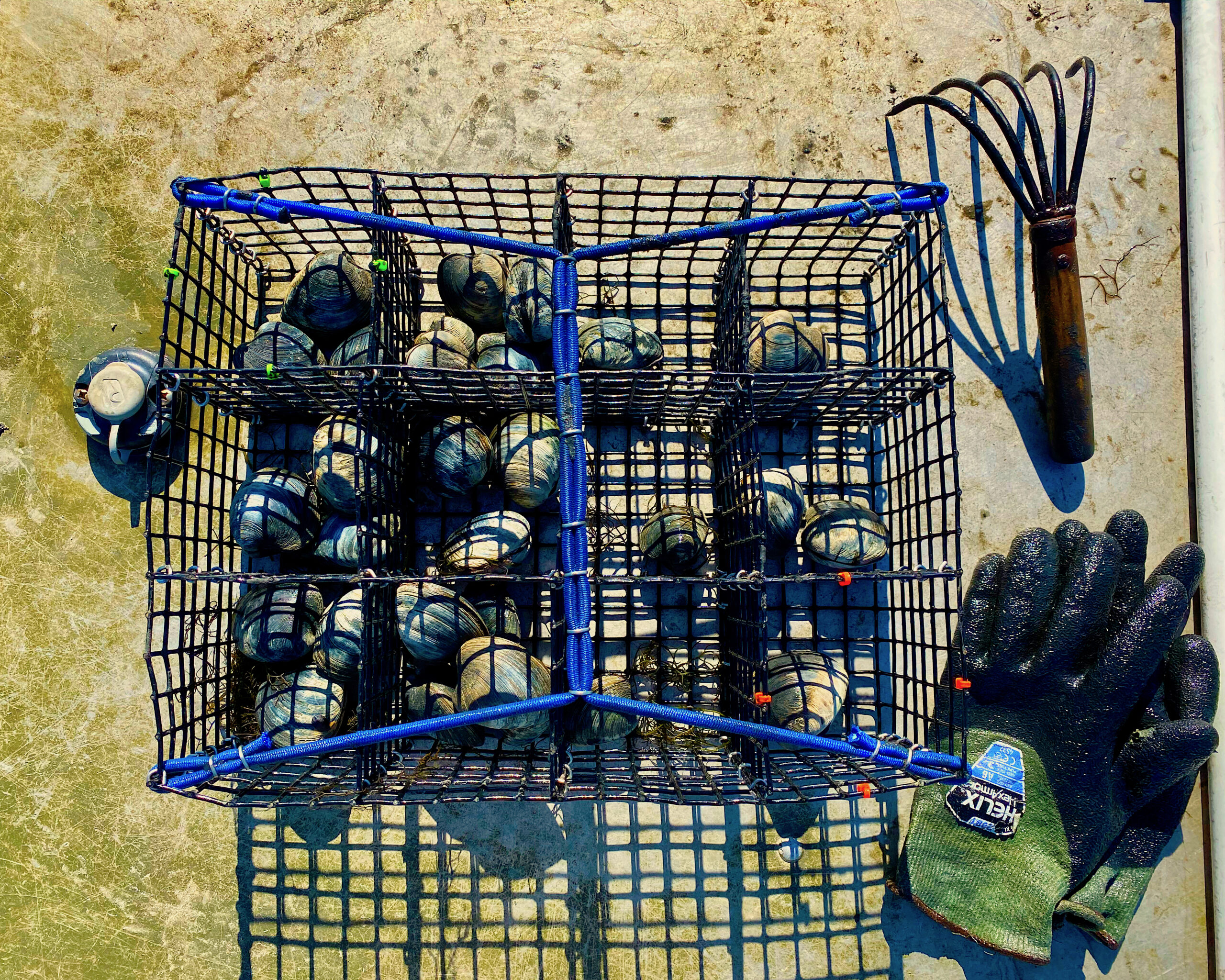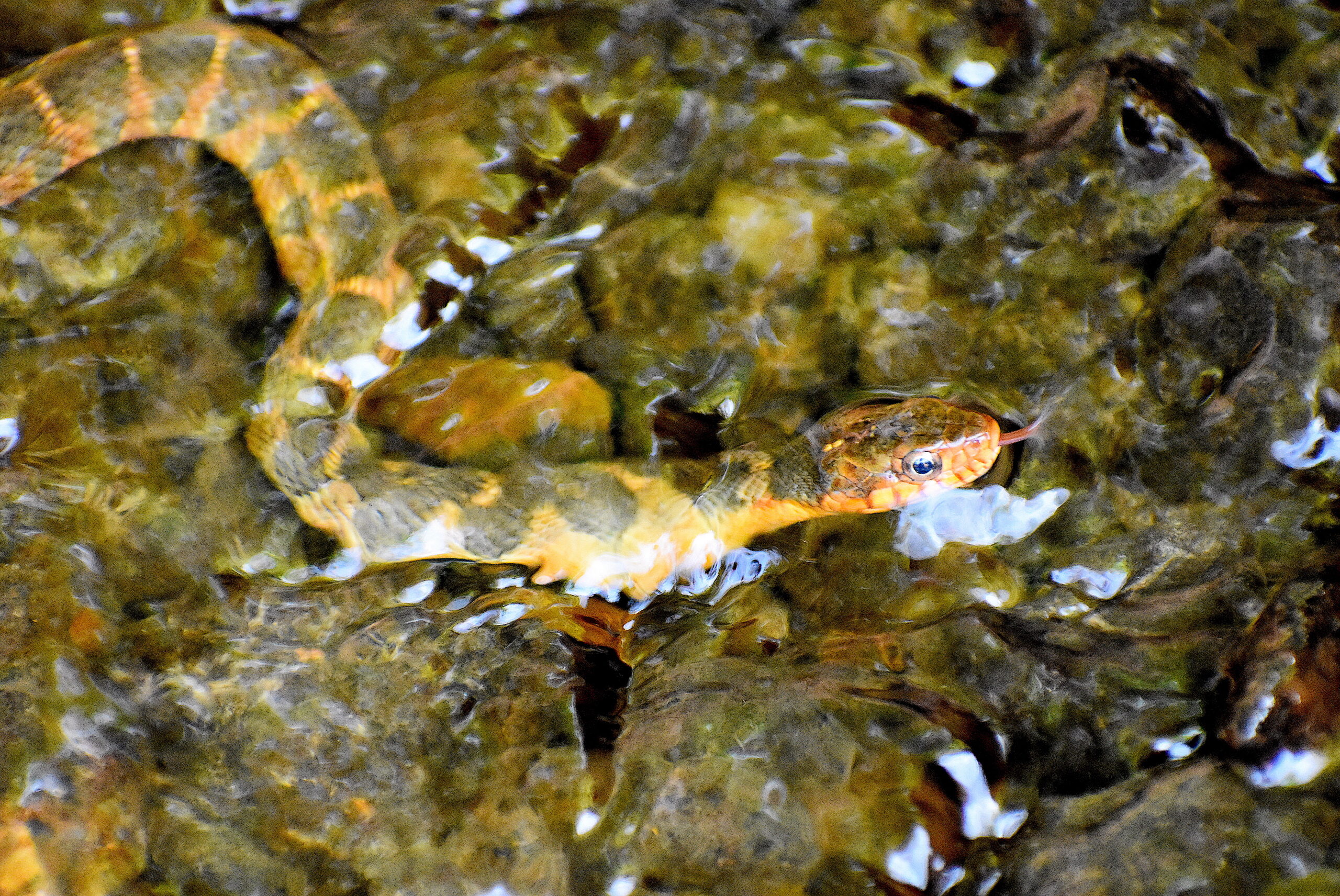Coastal Tidings: Do Ghost Forests Perpetuate Global Warming?
The latest research, news, and info.
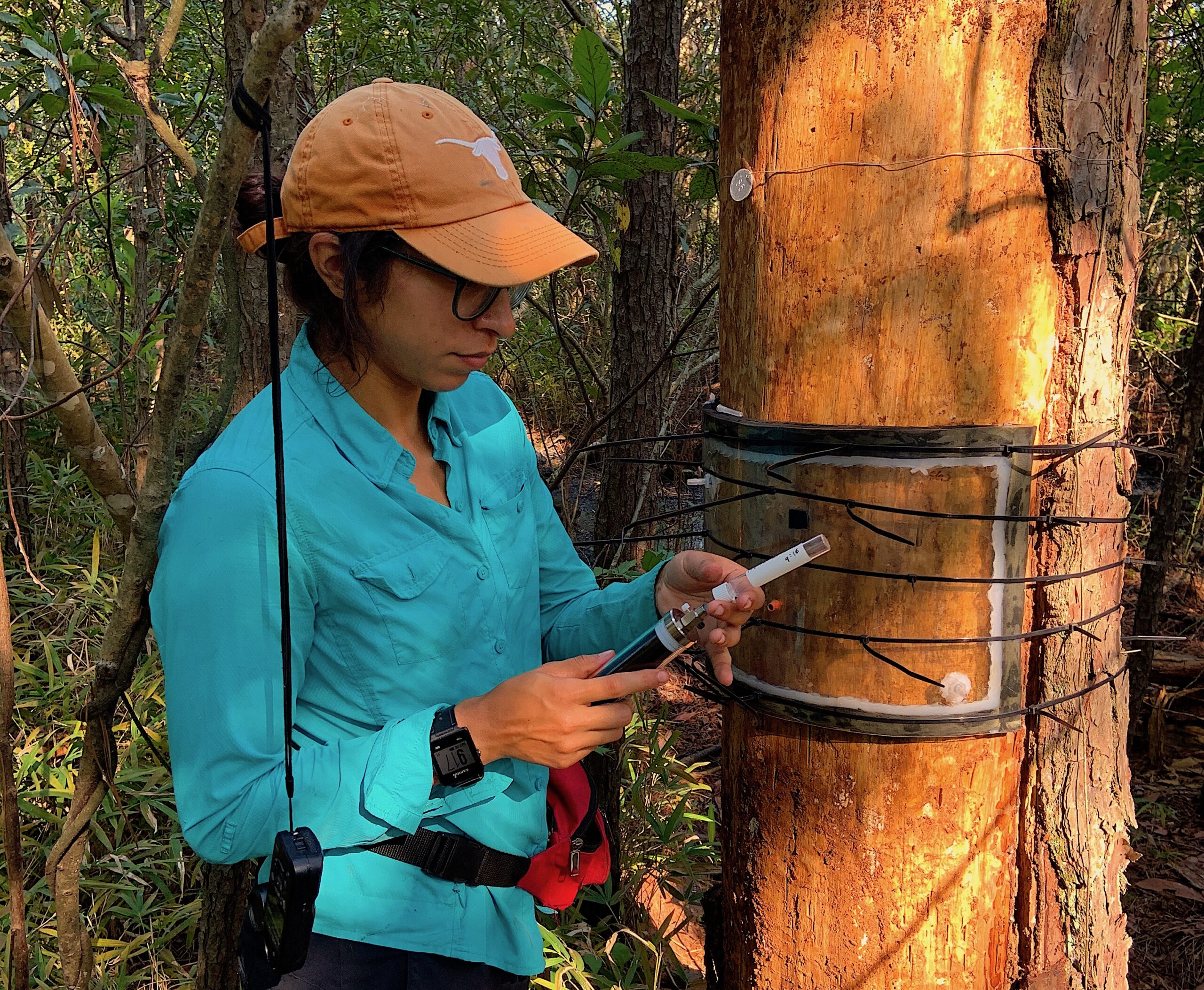
New research from Melinda Martinez, a joint fellow with North Carolina Sea Grant and NC Space Grant in 2019, has determined that standing dead trees in coastal wetland “ghost forests” are emitting greenhouse gases.
Martinez and NC State University’s Marcelo Ardón measured the quantity and type of greenhouse gas emissions from dead pine and bald cypress snags in five ghost forests on the Albemarle Pamlico Peninsula. They found that the snags increased emissions of the overall ecosystem by about 25%.
“Even though these standing dead trees are not emitting as much as the soils, they’re still emitting something, and they definitely need to be accounted for,” says Martinez, who recently completed her Ph.D. at NC State and now serves as a Mendenhall Fellow with the U.S. Geological Survey.
Researchers have been tracking ghost forests on the Albemarle-Pamlico Peninsula, terrain that formed due to sea level rise. Previous studies have projected that salinity from rising seas and more frequent flooding will further stress coastal ecosystems in the Southeast.
“The transition from forest to marsh from these disturbances is happening quickly, and it’s leaving behind many dead trees,” Martinez says. “We expect these ghost forests will continue to expand as the climate changes.”
• the full study: go.ncsu.edu/snags
• ghost forests in Coastwatch: go.ncsu.edu/ghost
— adapted from Laura Oleniacz’s NC State News story
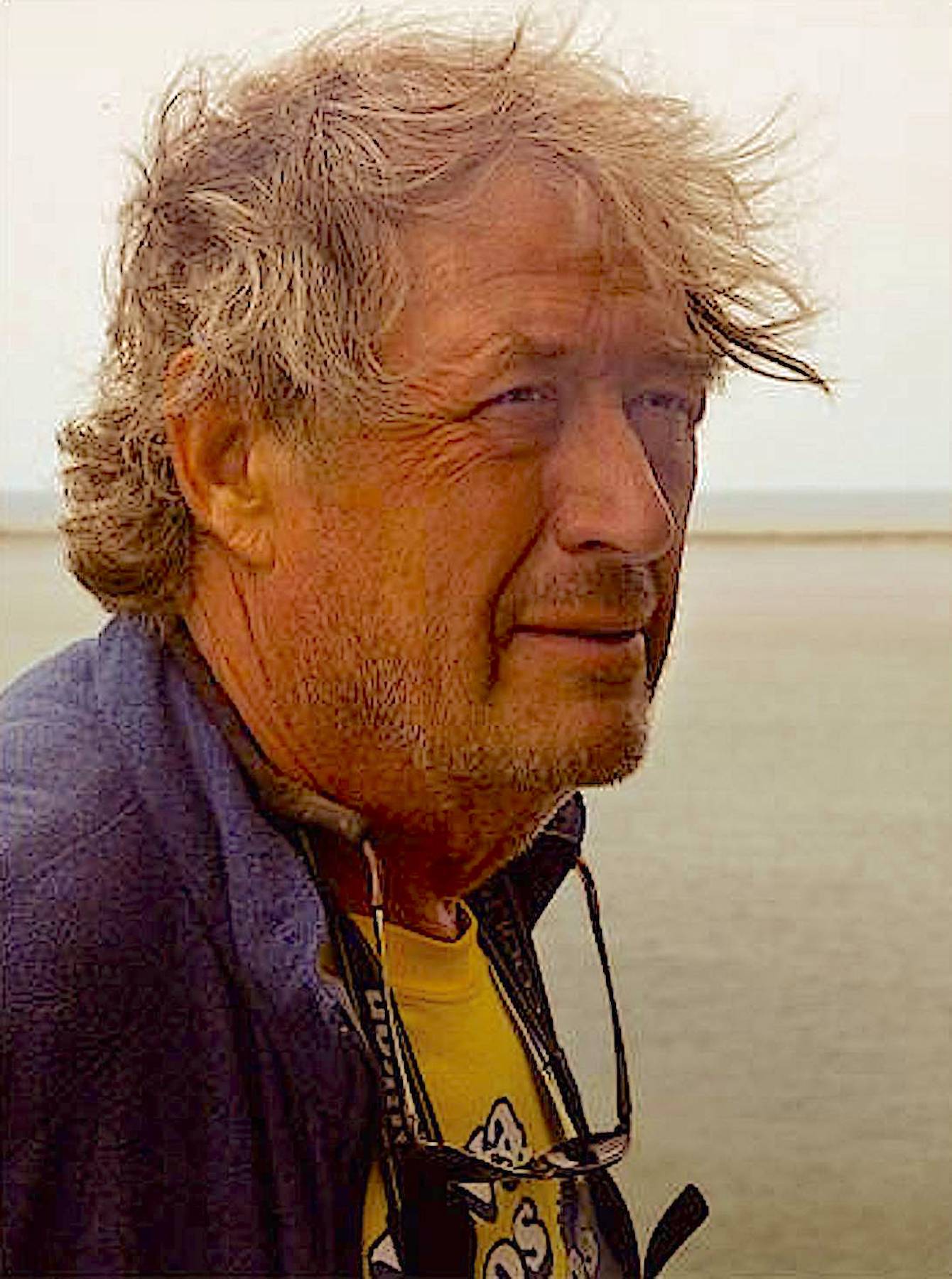
Riggs Wins Award for Career Excellence in Marine Geology
The Society for Sedimentary Geology has awarded East Carolina University’s Stanley R. Riggs the Francis P. Shepard Medal in recognition of his seminal contributions to marine geology.
“Stan has been at the forefront of research, trying to understand how our coastal systems work and respond to stressors,” says John Fear, North Carolina Sea Grant’s deputy director. “All those he has taught, encouraged, and inspired continue his work and are helping make our state more resilient to the constant hazards, natural and manmade, that we face.”
For decades, North Carolina Sea Grant has supported numerous projects Riggs spearheaded. During his career, he explored the water bodies around Roanoke Island, located sand resources off the Outer Banks and mapped the hard bottoms of Onslow Bay, and even trekked deep into the striking nightscapes of the Outer Albemarle Peninsula.
“This award is the product of a large team of coastal marine scientists and students working together since the 1960s to understand and manage the many complex aspects of North Carolina’s world-class coastal system,” says Riggs, who also has written for Coastwatch.
“Many different state and federal agencies, universities, nonprofits, local and state leaders, and particularly the local citizens in eastern N.C. have contributed to the science, funding, publication, education, and implementation aspects that led to this award,” Riggs says. “This is a team award.”
• Riggs’s nonprofit, NC Land of Water: NClandofwater.org
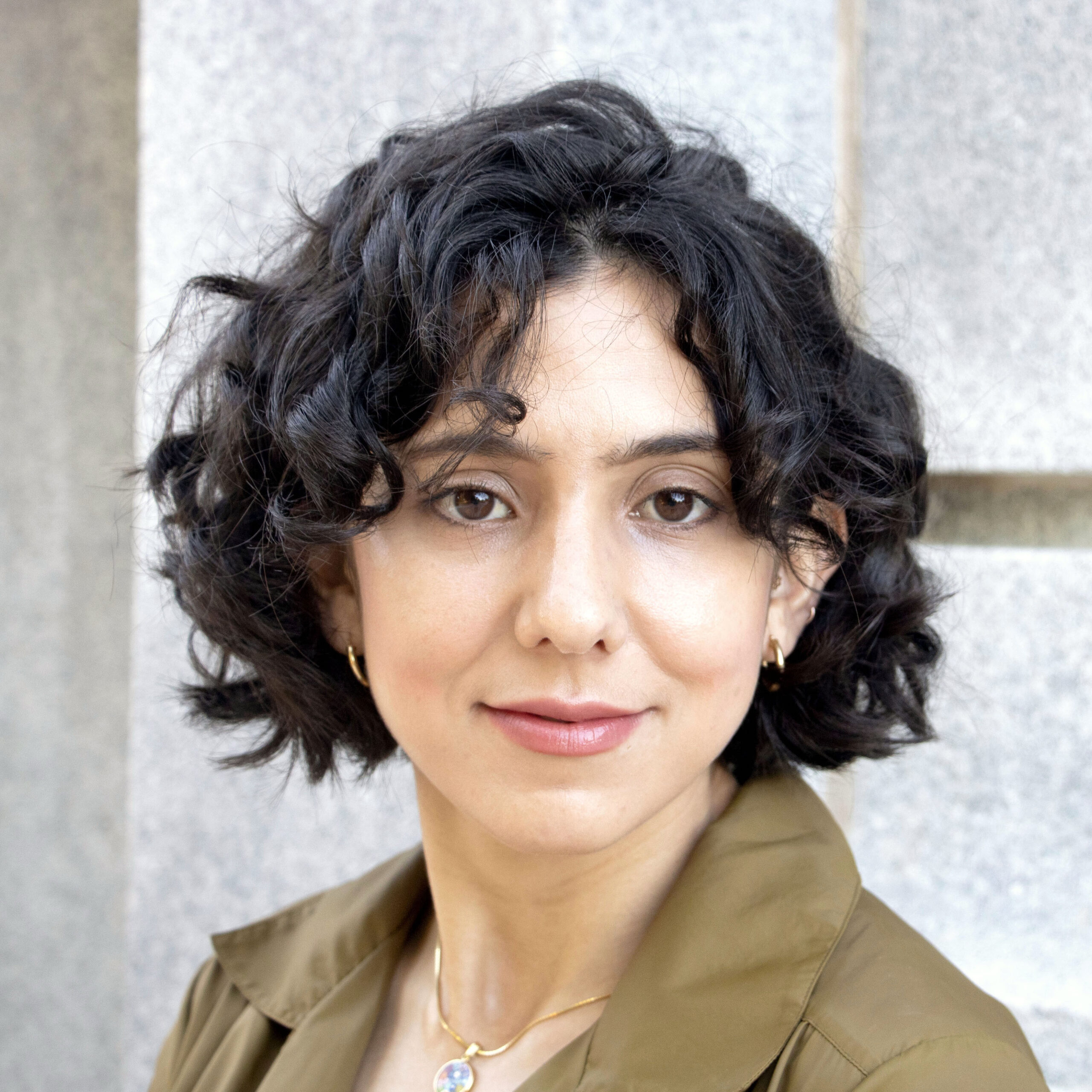
• “A Brief History of Sea Level Rise in North Carolina”:
go.ncsu.edu/a-brief-history
• “The Greatest Show on the East Coast:” go.ncsu.edu/greatest-show
NOAA and Sea Grant Select New Knauss Fellows
NOAA and Sea Grant have announced 74 finalists for the 2022 class of the Sea Grant John A. Knauss Marine Policy Fellowship program, including four graduate students from North Carolina: Olivia Vilá, Anderson Tran, Molly Bruce, and Colleen Baker.
The year-long fellowship honors John A. Knauss, a founder of the National Sea Grant program, NOAA administrator, and dean of the University of Rhode Island’s Graduate School of Oceanography.
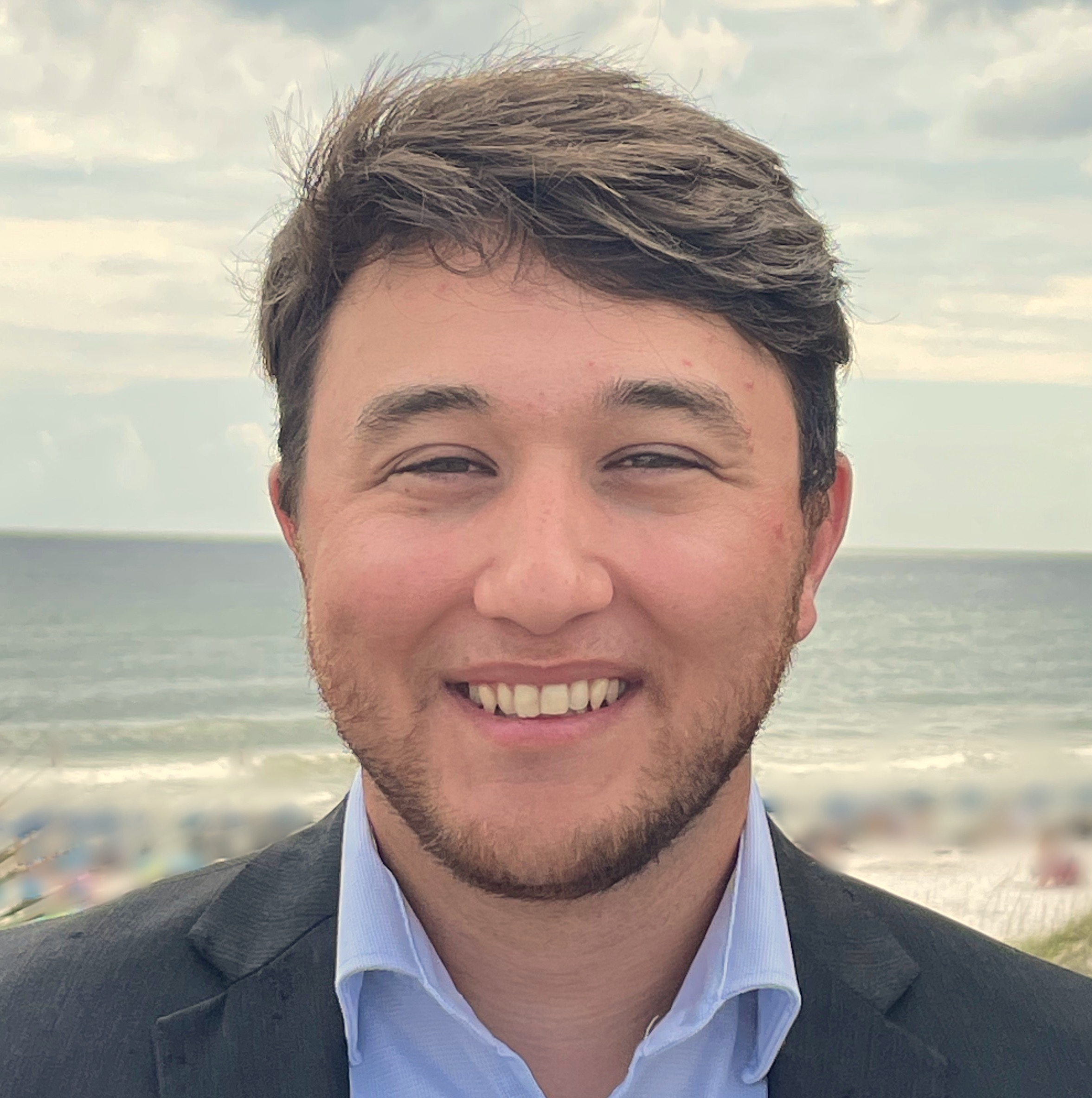
“The Knauss Fellowship program offers talented students an opportunity to delve deeply into the work of their host offices, offering their expertise and unique perspectives that absolutely enhance much-needed research, education, and outreach,” says Susan White, executive director of North Carolina Sea Grant.
The 2022 Knauss Fellowship finalists from North Carolina have a wide array of research interests and experiences.
Olivia Vilá, a Ph.D. candidate at NC State University, works with multiple interdisciplinary teams on hazard mitigation and resilience research. Her current work uses environmental justice, leadership, and policy frameworks to assess communities’ ability to engage in recovery and mitigation, as well as to support improvements.
“I look forward to being pushed outside of my intellectual and professional comfort zone,” Vilá says.
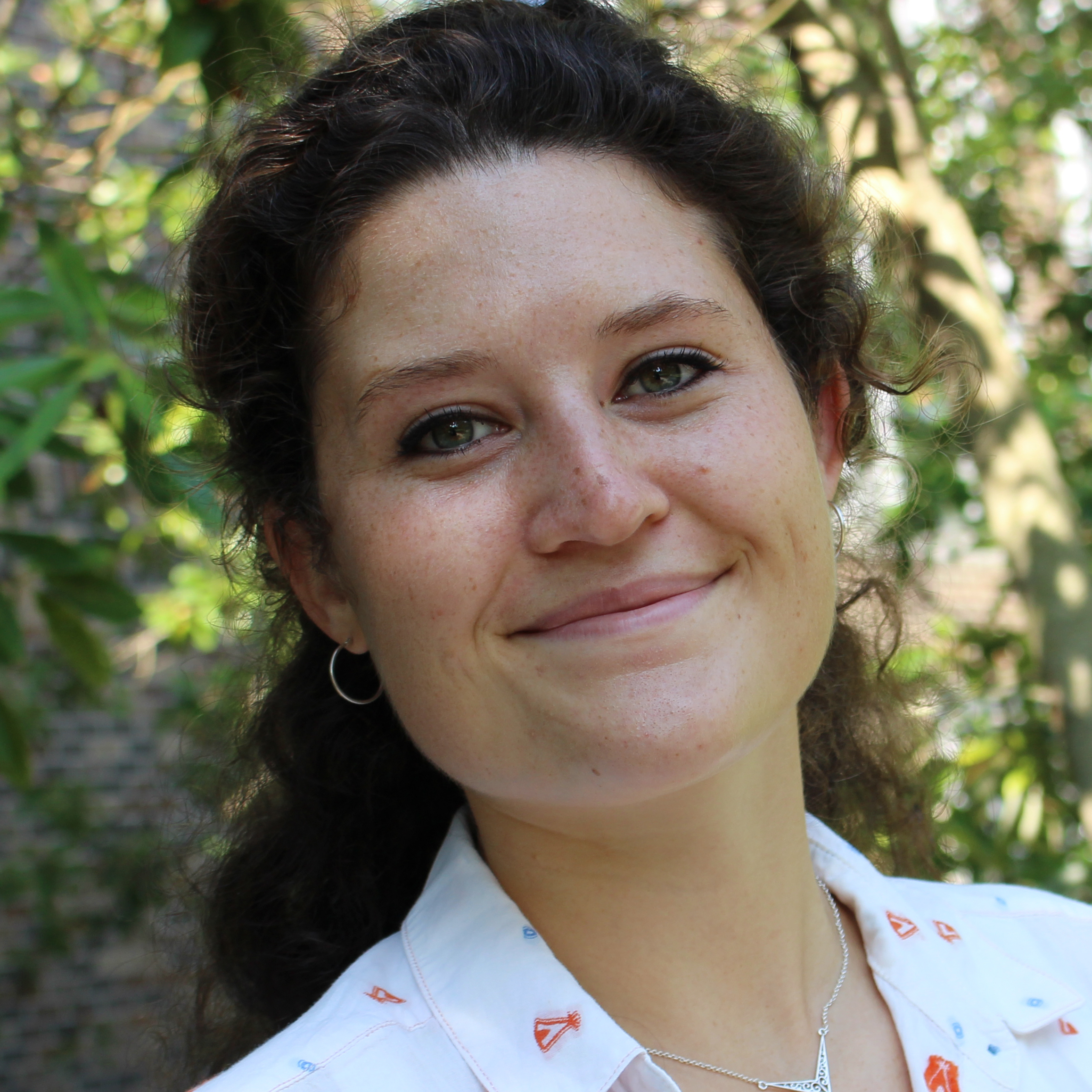
Anderson Tran received his law degree from the University of North Carolina at Chapel Hill. After years in the natural sciences, he shifted his career to law to become more involved in policy decisions that affect fisheries and other coastal resources.
“I hope to bring my merged scientific and legal training to help craft effective policy that will sustain our coastal resources to use and enjoy for generations to come,” Tran says.
Molly Bruce earned law and master’s degrees from Duke University, where she focused on the intersection between water and climate. She has participated in client-centered representation and environmental policy design, as well as research using remotely sensed data from drones and satellites to monitor coastal ecosystems.
“I’m excited by the incredible opportunities I’ll have as a Knauss Fellow to learn about federal policy design and the nuances of representing national interests,” Bruce says.
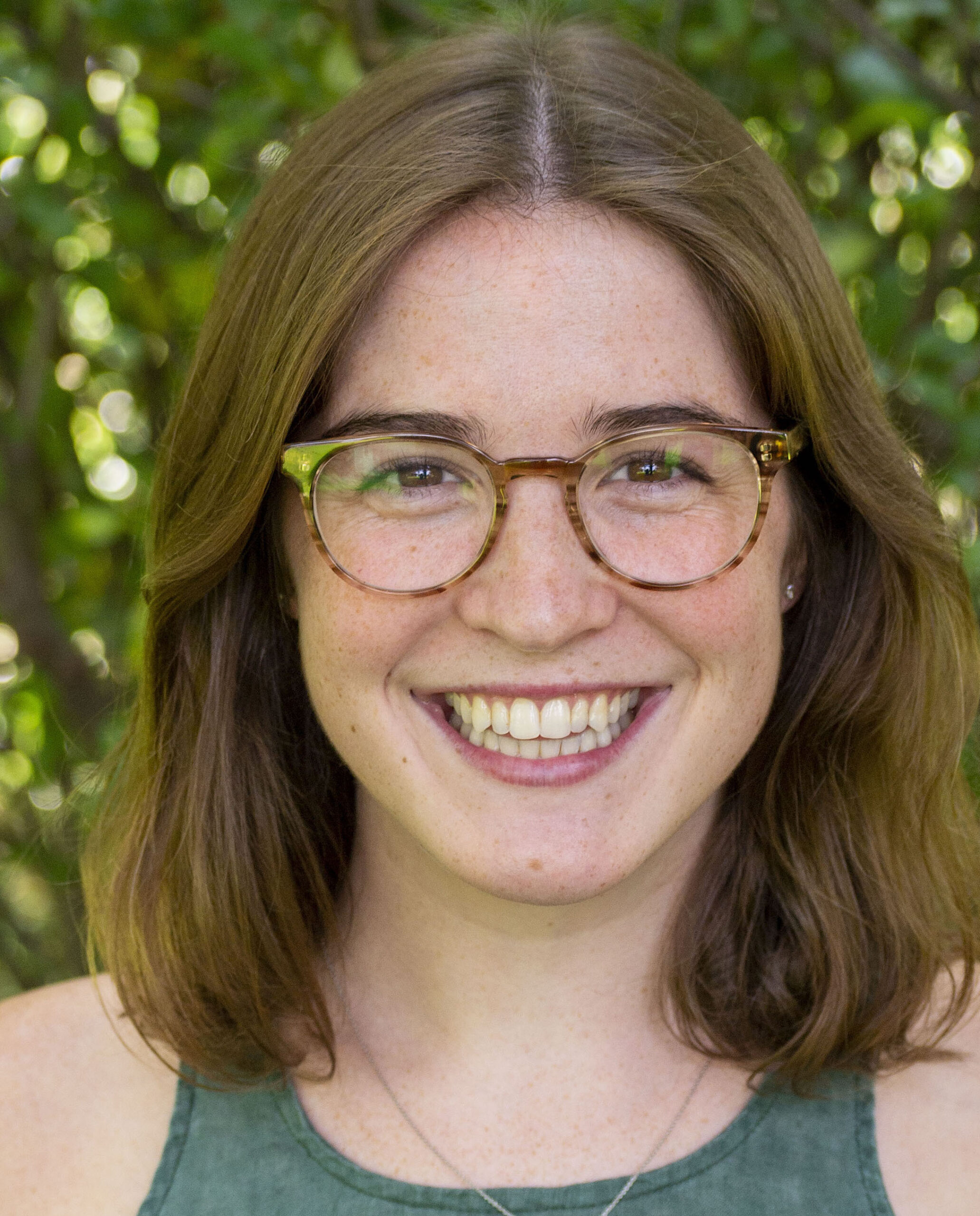
Colleen Baker holds a master’s degree from Duke University in environmental management, with a focus on coastal environmental management. Her research looks at small-scale fisheries and fisheries governance.
“I have spent a lot of time understanding management decisions and evaluating fisheries policies, but the Knauss Fellowship offers me the opportunity to be on the inside of decision making and implementation,” Baker says.
This year’s finalists join about 90 from North Carolina who have served during the four-decade history of the Knauss Fellowship.
• MORE: go.ncsu.edu/new-Knauss
— Lauren D. Pharr
Study Reveals Foul Play from Clavelina Oblonga
The invasive marine fouling species Clavelina oblonga reduces ecological diversity, according to new research that North Carolina Sea Grant and the National Science Foundation supported.
Marine fouling species are invertebrate filter-feeding organisms, like barnacles and mussels, and they also include soft-bodied “tunicates,” like Clavelina oblonga. Tunicates use tubular openings to siphon and expel water.
Given the recent proliferation of C. oblonga on the coast, researchers with NC State’s Center for Marine Sciences and Technology in Morehead City wanted to explore the invader’s impact.
David Eggleston and Kayla Christianson duplicated experiments performed 50 years ago in Beaufort. Along the docks, they observed submerged terra cotta plates and detected 22 different fouling species that settled on the plates.
They found that wherever C. oblonga settled, the species rapidly crowded out others. Even when cold weather and a hurricane removed C. oblonga, it quickly regrew, and again reduced diversity.
“C. oblonga has only been here since 2015, but it seems to have no real natural predators, it crowds out native species, and it has a foothold,” Eggleston says. “We will have to monitor this species and be sure that it doesn’t impact our local shellfish industry.”
• the full study: go.ncsu.edu/foul-play
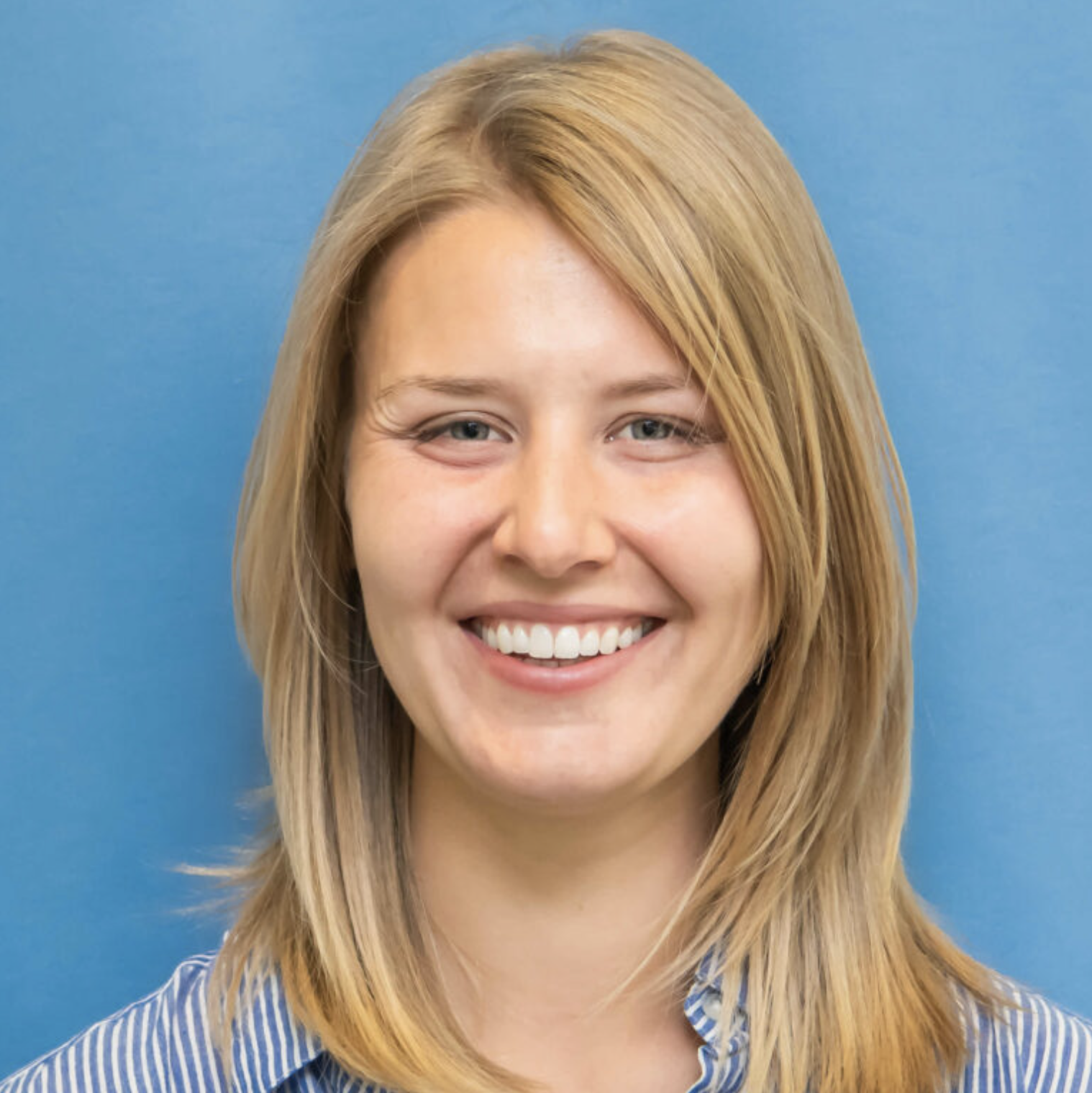
— adapted from Tracey Peake’s NC State News story
Cothron Joins Sea Grant to Support a Resilient NC
Cayla Cothron recently joined North Carolina Sea Grant’s team as a climate resilience extension associate.
“Cayla brings an impressive track record of working with communities as a public and private sector planner,” says Frank López, North Carolina Sea Grant’s extension director.
“Sea Grant serves a unique role in building relationships and facilitating discussions with communities,” says Cothron.
Cothron will connect with community members and natural resource managers, working alongside López, as well as North Carolina Sea Grant’s coastal resilience specialist, Sarah Spiegler, and coastal construction and erosion specialist, Spencer Rogers.
Cothron also will work directly with students, fellows, researchers, and other stakeholders. In particular, she will collaborate with the North Carolina Sentinel Site Program’s partners along the N.C. coast.
North Carolina is “positioned to have ongoing impacts from climate change,” Cothron says, adding that this requires planning in order to mitigate damage. For instance, she already has identified a project to help a coastal community improve its climate risk communication.
“We look forward to Cayla continuing our program’s commitment to helping coastal communities consider the immediate and longer-term impacts that they face from our changing climate,” López says.
• Cayla Cothron: go.ncsu.edu/cayla
— Carrie Clower
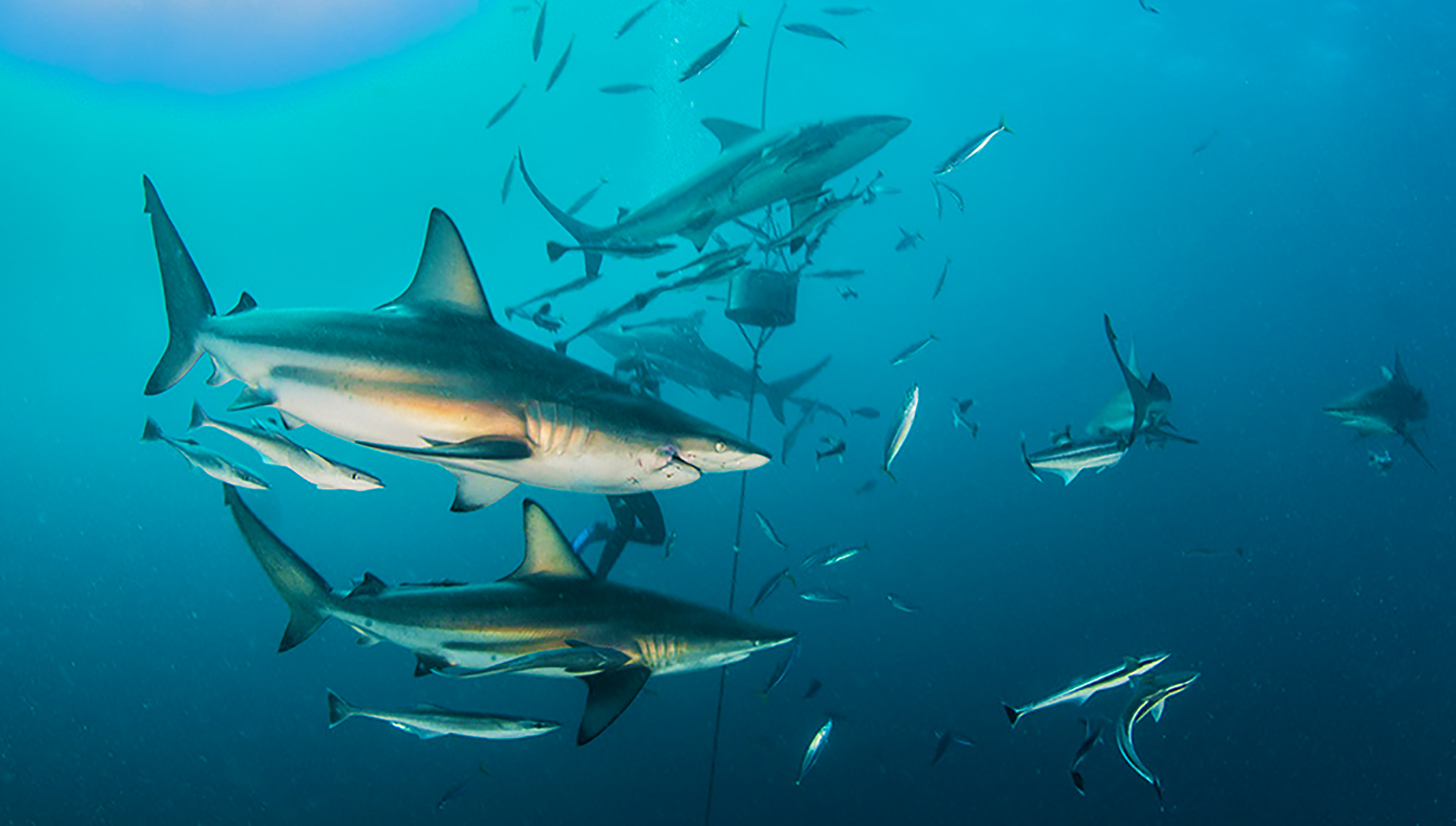
Community Projects Explore Sharks, Oysters, Youth Training, and More
Six new projects in North Carolina launch this year with support from the Community Collaborative Research Grant Program (CCRG). North Carolina Sea Grant administers the CCRG Program in partnership with the William R. Kenan Jr. Institute for Engineering, Technology and Science (KIETS) and the N.C. Water Resources Research Institute (WRRI).
“The CCRG program expands its reach across North Carolina with the latest round of projects,” says John Fear, deputy director for North Carolina Sea Grant and WRRI. “The ongoing focus on local needs and use of local knowledge sets up these projects for success.”
New River Oyster Restoration: Joel Fodrie of the University of North Carolina at Chapel Hill and Pat Donovan-Brandenburg of the City of Jacksonville will help identify where oyster restorations have succeeded on the New River to better plan future restoration efforts.
Youth Training and Conceptualizing Disaster: Kathryn Stevenson of North Carolina State University and Vequainn Joyner of the Boys and Girls Club of the Coastal Plain will work in an underserved community to understand how K-12 students conceptualize disaster and to explore how to better engage community members in disaster resilience efforts.
Contaminants and Sharks: Scott Belcher of North Carolina State University and Captain Charles Locke of F/V Salvation will work to compare contaminants present in four different shark species in the near shores of North Carolina, as well as to determine whether mother sharks pass contaminants on to their offspring.
Wetlands and Wastewater : East Carolina University’s Natasha Bell and Greenville Utilities Commission’s Jason Manning will work with a team of students to test a new hybrid constructed wetland at the Greenville Utilities Commission wastewater treatment plant.
Shoreline Erosion in Nags Head: Reide Corbett with East Carolina University and Holly White with the Town of Nags Head will be working to provide the town with highly accurate shoreline erosion data to inform Nags Head’s new Shoreline Management Plan.
Endangered Freshwater Mussels: Greensboro Science Center’s Lindsey Zarecky and the N.C. Wildlife Resources Commission’s Rachel Hoch will create a new innovative visitor display at the Greensboro Science Center, based on endangered freshwater mussel research, and also will develop a video about freshwater mussels.
“The CCRG program provides stakeholders an opportunity to collaborate on community-related initiatives that address relevant problems and issues,” says Raj Narayan, associate director of KIETS. “The CCRG continues to nurture the creativity and resiliency of these communities and enables authentic partnerships focused on developing innovative approaches and solutions with beneficial outcomes and impact.”
• MORE: go.ncsu.edu/CCRG

— Lauren D. Pharr
Sea Grant and Space Grant Announce Joint Fellows
North Carolina Sea Grant and NC Space Grant have awarded joint graduate research fellowships to Maya Hoon of the University of North Carolina at Chapel Hill and Jessica Richter of East Carolina University.
The fellowships support graduate students researching high priority needs within North Carolina watersheds, coastal areas, and nearshore environments. Fellows can utilize data from the vast archives and remote sensing capabilities of NASA and NOAA, including data collected from airplanes, unmanned aerial vehicles, unpiloted submersibles, and other technologies.
Hoon will study how heavy metals influence the genes of microbes in the Neuse River Basin. She plans to compare the genes of organisms from the water to those in the sediment, looking for evidence the organisms are developing a tolerance for heavy metals.
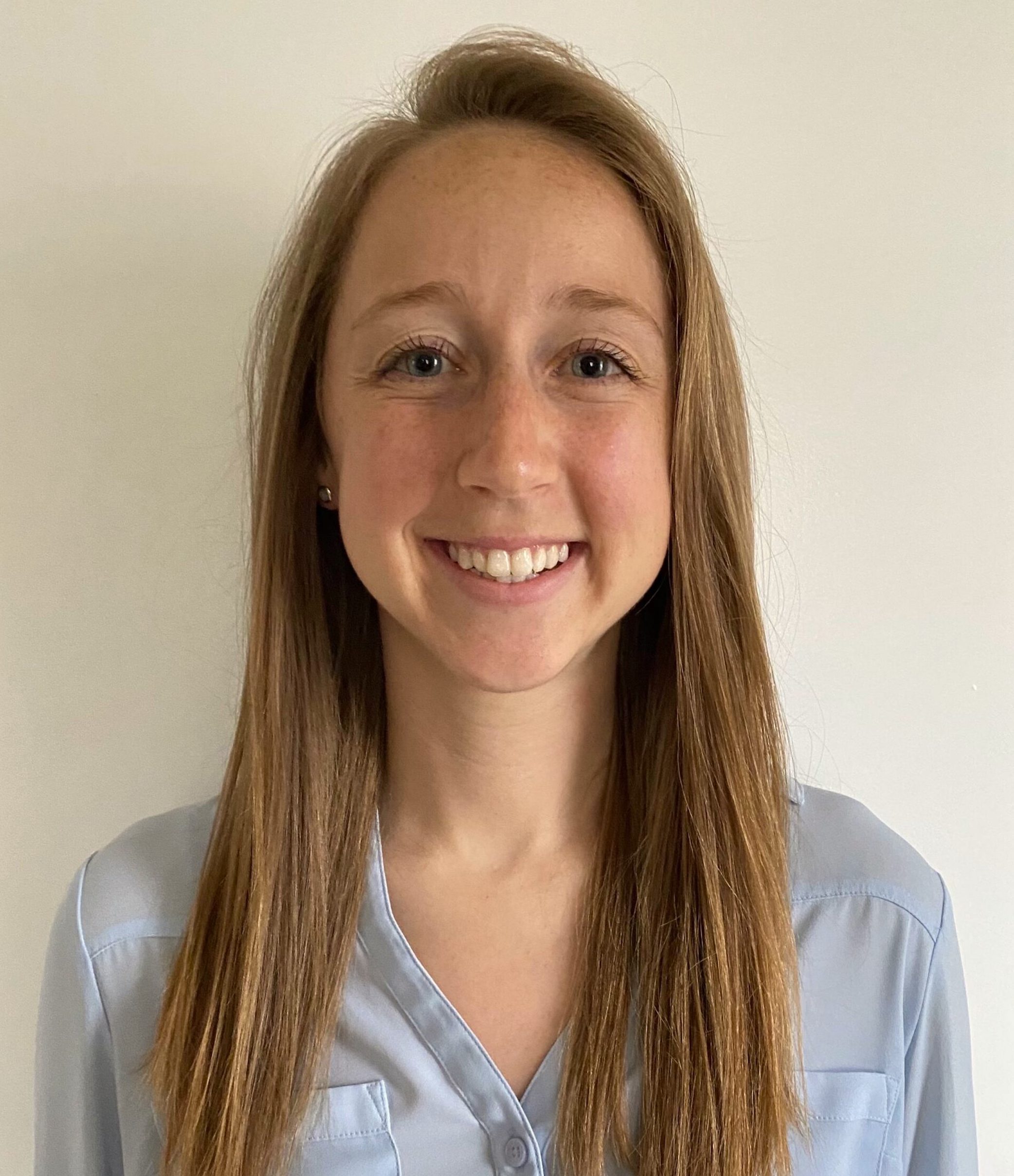
Richter will generate updated shoreline maps of the Neuse River Estuary that capture shoreline erosion. The maps will provide additional tools for local planners in Craven and Pamlico counties, offering important context regarding storm-induced erosion and informing future mitigation and restoration efforts.
“This fellowship uniquely encourages students to discover ways to expand their research, using new tools and data sets, or to find new topics for tools that they know well,” says Jobi Cook, associate director of NC Space Grant. “We’re looking forward to the innovations this year’s fellows will bring to their fields.”
• MORE: go.ncsu.edu/sea-space
— Lee Cannon
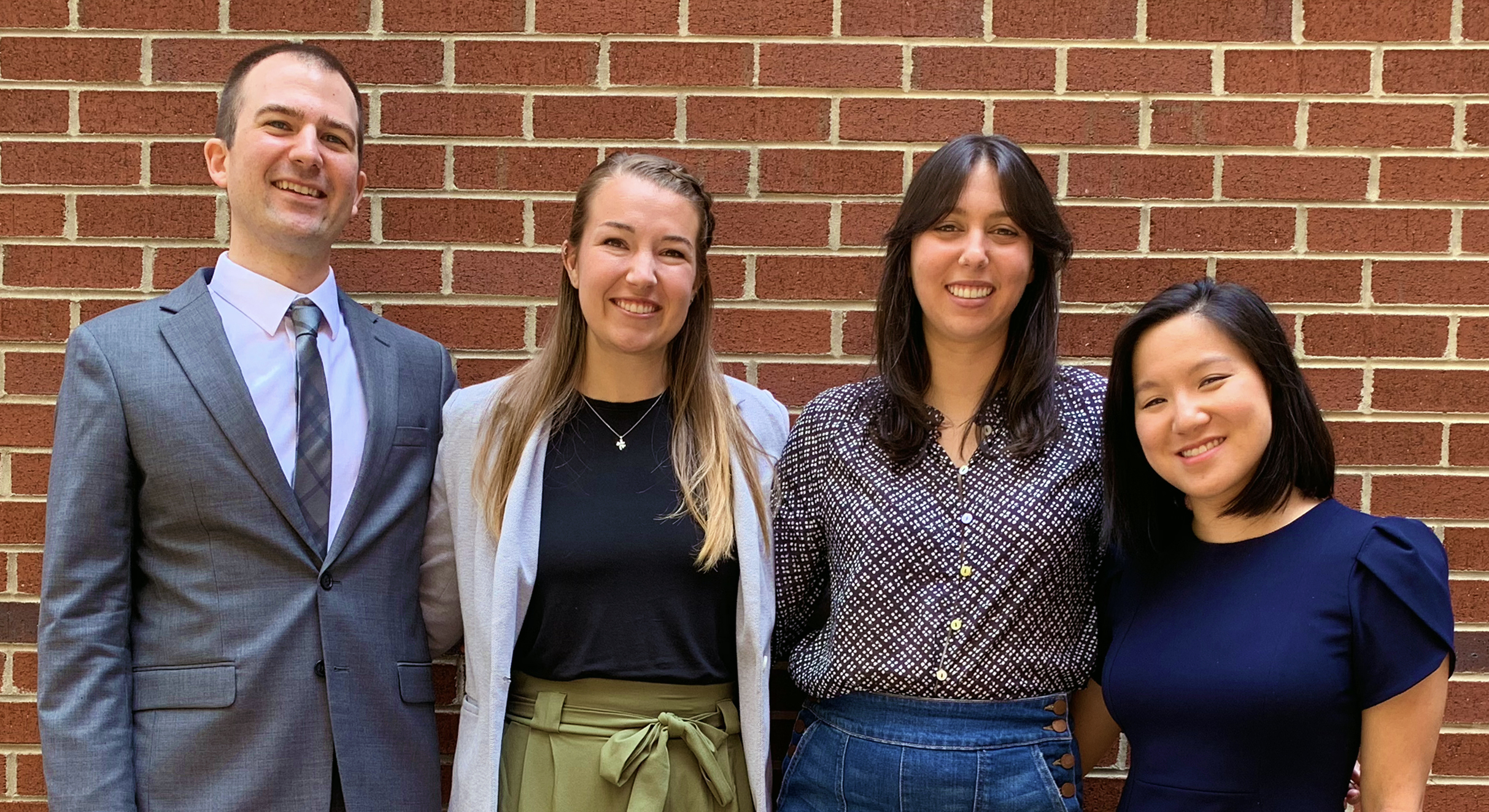
Left to right: Matthew Kollman, Stephanie Batalis, Emma Hughes, and Rachael Wolff. Credit: Julie Leibach.
NC Science Policy Fellows Begin State Government Assignments
Four new North Carolina STEM Policy Fellows recently began yearlong roles in high-level state government offices. The fellowship provides non-academic career opportunities for recent graduate students in science, technology, engineering, and math.
“Our incoming fellows will bring new perspectives and energy as they address policy challenges and opportunities on important issues,” says Susan White, North Carolina Sea Grant’s executive director. This year’s fellowship class includes students from four North Carolina universities.
Matthew Kollman, a doctoral candidate at NC State University, studies the chemistry of deriving sustainable products from renewable resources.
“As an NC STEM Policy Fellow, I look forward to working on a wide range of topics, while learning about and supporting advances in science and technology by innovative North Carolinians,” says Kollman, who will serve in the N.C. Department of Commerce Office of Science, Technology & Innovation.
Emma Hughes graduated with a masters from Duke University’s Nicholas School of the Environment.
“I became interested in using my knowledge and skills to uplift the protection and preservation of natural and cultural resources during my time at Duke, and I’m excited to continue this type of work,” says Hughes, who will serve with the N.C. Department of Natural and Cultural Resources Office of the Secretary.
Rachael Wolff recently graduated with a master’s degree in city and regional planning from the University of North Carolina at Chapel Hill.
“As a storyteller at heart, whether through data or words, I think this fellowship will be a great opportunity to communicate the initiatives of the State Energy Office and transform science policy into equitable action,” Wolff says of her new role in the N.C. Department of Environmental Quality.
Stephanie Batalis has devoted the past four years to pursuing her Ph.D. in biochemistry at Wake Forest University.
“My current work in Wake Forest Innovation Quarter, a designated North Carolina Research Park, has shown me what can happen when research and innovation meet,” says Batalis, who will serve with the North Carolina Biotechnology Center to support in-state innovation.
The 2021 NC STEM Policy Fellowships also include professional development sessions in science policy and communication, developed in partnership with Sigma Xi, The Scientific Research Honor Society, based in Research Triangle Park.
North Carolina Sea Grant administers the fellowship, now in its second year, with a matching grant from Burroughs Wellcome Fund and support from some of the fellowship host offices.
• MORE: go.ncsu.edu/stem-fellows
— Lauren D. Pharr
- Categories:
